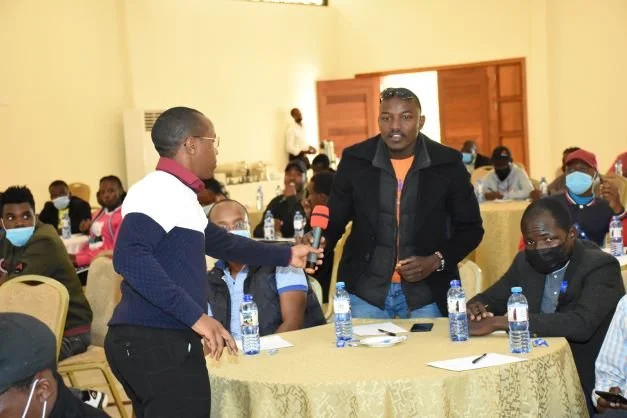Despite the vast differences between Civil Society Organizations (CSOs) and Non-governmental organizations (NGOs), most share a common dilemma: Lack of funds, which limits the quantity and/ or quality of the important work they do. CSOs increasingly find that grants and donations are inadequate to meet their program needs, let alone to expand program activities. This, therefore, calls for better local resource mobilization to enable them to meet their diverse needs.
The State Of Institutional Philanthropy In East Africa - 2021
The East Africa Philanthropy Network (EAPN) seeks to enhance the knowledge base and promote best practices for organized philanthropy. This will be realized by investing in research and innovation, documentation, and dissemination, and offering capacity strengthening support to EAPN members and other philanthropy actors. EAPN recognizes the need for relevant data as a basis of effective monitoring, reporting, and coordinating philanthropy efforts in the ever-changing landscape of institutionalized philanthropy in East Africa.
Strengthening An Enabling Environment For Community Philanthropy In East Africa.
The development field recognizes African philanthropy by its unique characteristics, deeply rooted in community culture and traditions of interpersonal connectedness and social solidarity. In recent years, the emergence of African philanthropy narratives aims to appreciate African giving models that continue to inform giving.
Sexual Harassment, Exploitation And Abuse (SHEA) At Work Policy
This policy aims to ensure that TYC provides a safe working environment that is free from sexual harassment, exploitation, and abuse and upholds the rights and dignity of all. TYC is committed to preventing and responding robustly to any form of sexual harassment, exploitation, and abuse in the workplace carried out by any member of the TYC representative.
Sexual Harassment, Exploitation, And Abuse (SHEA) And Other Safeguarding Concerns Overarching Policy
The Youth Cafe is committed to preventing any form of sexual harassment, exploitation, and abuse (including child abuse and adult at-risk abuse) and responding robustly when these harms occur. SHEA and Safeguarding incidents are rooted in an imbalance of power, particularly gendered and sexualized abuses of power. Safeguarding refers to the policies and processes an organization puts in place to prevent and respond to harm by staff or those working on our behalf. TYC’s SHEA and Safeguarding policies sit under the AAI Code of Conduct and are informed by and reinforce TYC’s feminist leadership approach.
Protection From Sexual Exploitation And Abuse (PSEA) Policy
The Youth Cafe (TYC) is committed to preventing and responding robustly to any form of sexual harassment, exploitation, and abuse in the workplace that any member of the TYC representative carries out. This policy aims to ensure that TYC provides a safe working environment that is free from sexual harassment, exploitation, and abuse and upholds the rights and dignity of all.
Safeguarding At The Youth Cafe | Our Policies And How To Report A Concern
Our Safeguarding Policy outlines our commitment to protecting anyone who comes into contact with The Youth Cafe from sexual harassment, exploitation, and abuse in all its forms. The Youth Cafe recognizes that these harms are gross human rights violations rooted in an imbalance of power, particularly gendered and sexualized abuses of power. This Policy is supported by the Child Safeguarding Policy, Protection from Sexual Exploitation and Abuse (PSEA) Policy, and Sexual Harassment, Exploitation, and Abuse (SHEA) at Work Policy.
IGLUS Quarterly Vol 8 Issue 2 | Housing Challenges In African Cities In Collaboration With IGLUS
There is a need to re-examine current processes and policies to enable short-term and long-term solutions to informal urban housing in African cities. By considering this, in this issue of Innovative Governance of Large Urban Systems (IGLUS) Quarterly having four unique articles, we will discuss the growing concern of providing equitable and accessible options for youth housing by also reviewing the current approaches, best practices and case studies currently being utilized with a focus in African cities within the urban realm
Digital Media And Information Literacy In Civic Engagement | A Handbook For Young People And Youth Organizations
This handbook will help young people and youth-led organizations to advance their digital media and information skills. It contains four chapters that have been broken down to address key concepts with regard to digital media and information literacy. Living in the 21st Century, media has rapidly become central to everyday life. Through the ever-improving use of technological tools such as mobile phones, tablets, laptops, and computers, users have the opportunity to engage in anything from political and social debates and educate, inform, and entertain themselves and others around the world.
Intersectional Rapid Gender Analysis in Embakasi | Advancing Youth Digital Media and Online Civic Reasoning
Equipping young people in Kenya and at large Africa with key media literacy, critical thinking, and fact-checking skills in today’s world is of high importance. Now more than ever young people need to improve the manner in which they use digital media not only for their own benefit but also for the betterment of their country’s development. This Intersectional Rapid Gender Analysis Report was seeking to identify the challenges and needs women, men, boys, girls, and gender non-conforming persons in Embakasi are facing when it comes to digital media literacy and civic engagement.










